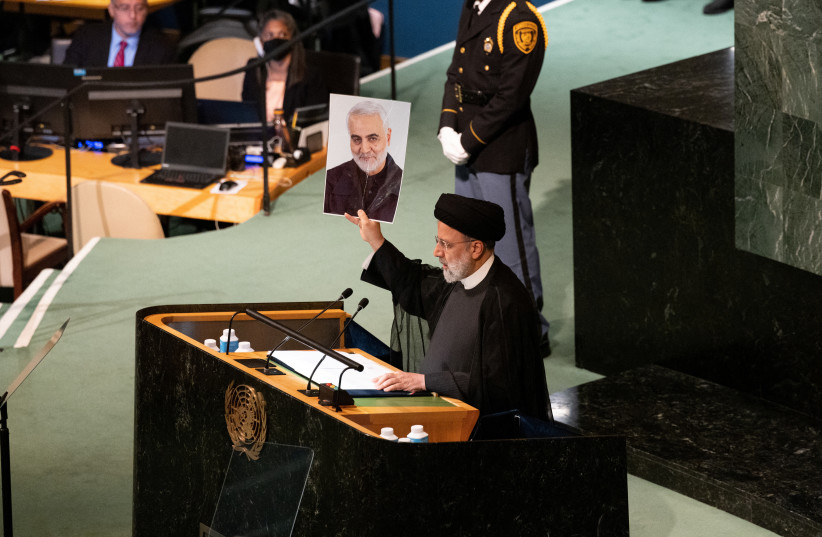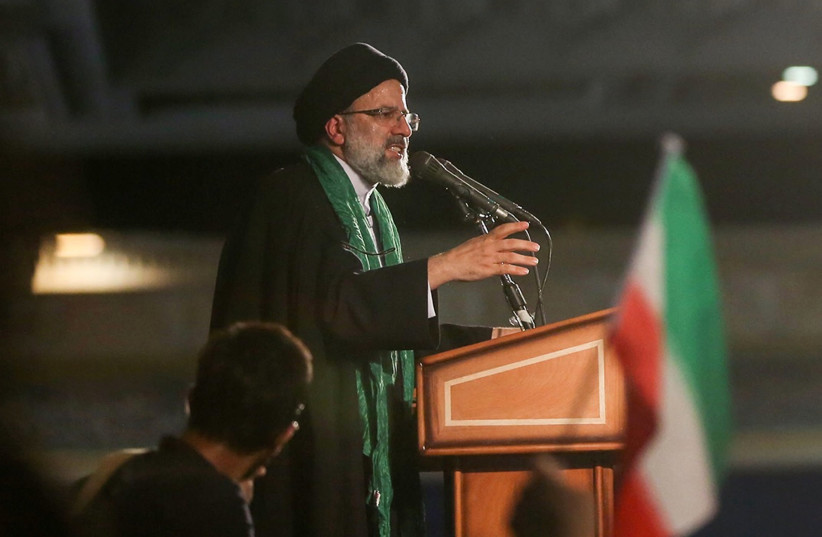Anyone who was looking for confirmation that Iran nuclear talks were going to remain on hold for a while – perhaps indefinitely – need look no any further than Iranian President Ebrahim Raisi’s remarks at the UN General Assembly on Wednesday.
Raisi demanded more guarantees and assurances from the US that it would not leave the nuclear deal.
“The issue of guarantees is not just about something that may happen,” he said. “We are basing it on lived experience... Can we really trust [the US] without guarantees and assurances that it will live up to the agreement this time?”
Raisi said more or less that US sanctions don’t bother Iran – “We have managed to neutralize the [American] sanctions in many cases” – even though earlier in the speech, he called them a “weapon of mass destruction” against the Iranian people.
Raisi said Iran “found our path, independent of any agreement, and will continue steadfastly.”

In other words, give Iran what it wants, or they’ll be just fine without a nuclear deal – sanctions and all.
A day earlier, with French President Emmanuel Macron, Raisi demanded that the International Atomic Energy Agency close its investigation into undeclared nuclear sites in Iran. Macron responded that “Iran and the IAEA can resolve the cases through cooperation. We won’t pressure the IAEA.”
Speaking to the French media soon after, Macron said that “the ball is now with Iran, which must say whether it accepts the conditions that have been proposed by the Americans and the Europeans,” such as that the IAEA must remain independent.
If Iran can’t accept that, “in effect that would mean we won’t close” a deal, the French president said.
The mention of guarantees and assurances and the IAEA probe are not-so-subtle clues that Iran is not in the mood for compromise, since those are the major issues holding up negotiations with world powers to return to the 2015 Joint Comprehensive Plan of Action.
The Iran talks’ coordinator, the EU, gave a “final” text of the renewed deal to the sides in early August. Iran responded to the draft with a “yes, but,” bringing up some issues, but the other parties to the talk still thought the gaps could be bridged quickly and the US sent a response.
Iran gave more demands at the UNGA

Soon after Iran made even more demands, including the guarantees Raisi mentioned in his address.
Iran wanted to be sure that unlike in 2018 – when then US president Donald Trump left the deal over Iran lying about seeking nuclear weapons and continuing to fund terrorism and proxy warfare – this time no president would leave the deal before it expired in 2030.
However, US President Joe Biden cannot legally make that promise, because he cannot bind a future president to his foreign policy unless it comes in the form of a treaty ratified by Congress – and the Iran deal was designed to avoid that process.
In addition, Iran wants guarantees that Western companies will do business in the Islamic Republic, since many were hesitant in 2015. While Washington agreed to provide information to businesses that they can work with Iran without risking sanctions, the US and E3 – Britain, France and Germany – cannot force companies to work in Iran.
Those businesses may have reasonable concerns about working in a pariah state that has faced heavy sanctions, which could come back in 2030 or even before if the US withdraws again or Iran violates the deal.
Iran also insisted on closing the IAEA probe, something that the Western parties to the talks have said will not happen without Iran first cooperating with the investigation.
After Iran submitted those demands, the US said they were not productive.
What were the responses to the demands?
EU High Commissioner for Foreign Affairs Josep Borrell said the demands could derail the process entirely.
“We were converging to a closer position and the initial requests that we received were reasonable... and they were taken aboard without countering the text fundamentally,” Borrell said of Iran’s earlier response. But Tehran’s new demands for additional guarantees from Washington last week are “not converging, [they are] diverging... That’s very much worrisome.”
Negotiations have been on hold ever since. Israeli officials have said they heard from their American counterparts that they will not return to the talks until after the midterm election on November 8.
US law requires a 30-day congressional review period before any deal lifting sanctions on Iran can be implemented, which would put a potentially unpopular agreement on the agenda right before Election Day.
There is also the matter of the Iran deal’s nonproliferation benefits, which officials in Washington, Brussels, Paris and others have been warning for the better part of a year will become irrelevant if an agreement is not reached soon.
With his remarks at the UNGA, Raisi used the world’s stage to double down on the very demands that led to the talks being shelved, calling into doubt whether they can be picked up again at all.
